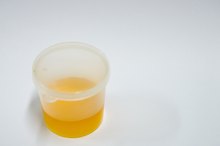BUN Vs. Serum Creatinine: Which Is Better for Renal Insufficiency?
Normally, your kidneys screen impurities from your bloodstream. The result of this process is the removal of waste materials and excess fluid in the urine. Occasionally, infections, injuries and disease hamper the ability of the kidneys to perform this process, resulting in renal insufficiency. To confirm a suspicion of renal insufficiency requires evaluating test results together with signs and symptoms to make a final diagnosis. Two important tests are the blood urea nitrogen, or BUN, and the serum creatinine 1.
If you are experiencing serious medical symptoms, seek emergency treatment immediately.
Serum Creatinine
Creatinine, a waste material, comes from the breakdown of protein in your body. The kidneys filter out the creatinine and eliminate it in the urine. The portion of the kidneys that filters out the creatinine, called the glomerulus, is susceptible to blood vessel problems and infections that cause more creatinine to build up in the bloodstream. The serum creatinine blood test measures the amount of creatinine in the bloodstream when the kidneys are unable to remove it. An elevated serum creatinine reliably reflects renal insufficiency but is taken into consideration with the urine creatinine clearance and blood urea nitrogen.
- Creatinine, a waste material, comes from the breakdown of protein in your body.
- The portion of the kidneys that filters out the creatinine, called the glomerulus, is susceptible to blood vessel problems and infections that cause more creatinine to build up in the bloodstream.
Blood Urea Nitrogen
What Is Normal Amount of Protein in Urine?
Learn More
Urea nitrogen comes from protein intake and the breakdown of protein in tissues. Levels of urea nitrogen in the blood fluctuate with a number of conditions such as:
- increased protein intake
- intestinal bleeding
- infection
- fever
- dehydration
- medications
- burns
The blood urea nitrogen test doesn't indicate renal insufficiency as well as the serum creatinine, since changing factors contributing to fluctuating values unrelated to kidney function may be present. The BUN should be considered along with the serum creatinine test.
Renal Insufficiency
Some individuals who develop renal insufficiency exhibit few or mild symptoms or the deficit in kidney function is noted during a yearly physical with no obvious symptoms. In the extreme, an individual might present with extremely high blood pressure, rapidly decreasing kidney function or frank kidney failure. The insufficiency can result from decreasing arterial blood flow to the kidneys as a consequence of renal artery disease. Renal artery stenosis, a narrowing of the arteries caused by plaque formation, leads to renal artery disease. With the reduction of blood delivered to the kidneys for screening and purifying, excess body fluids and wastes build up, blood pressure rises and renal insufficiency follows.
- Some individuals who develop renal insufficiency exhibit few or mild symptoms or the deficit in kidney function is noted during a yearly physical with no obvious symptoms.
- The insufficiency can result from decreasing arterial blood flow to the kidneys as a consequence of renal artery disease.
Risk Factors
Can Diet Increase Albumin Levels?
Learn More
Additional contributing factors include a family history of renal disease, high blood pressure and obesity. Individuals at even higher risk include those with a diagnosis of coronary artery disease, peripheral vascular disease or atherosclerosis.
Related Articles
References
- Lab Tests Online: Creatinine
- Medline Plus: Chronic Kidney Disease
- "Current Medical Diagnosis & Treatment"; Kidney Disease; Suzanne Watnick and Gail Morrison; 2008
- National Kidney Foundation. Tests to Measure Kidney Function, Damage and Detect Abnormalities.
- National Kidney Foundation. Tests to Measure Kidney Function, Damage and Detect Abnormalities.
- Kildow BJ, Karas V, Howell E, et al. The Utility of Basic Metabolic Panel Tests After Total Joint Arthroplasty. J Arthroplasty. 2018;33(9):2752-2758. doi:10.1016/j.arth.2018.05.003
- National Institute of Diabetes and Digestive and Kidney Diseases. Glomerular Diseases. Updated April 2014.
- National Kidney Foundation. Acute Kidney Injury (AKI).
- National Kidney Foundation. 5 Drugs You May Need to Avoid or Adjust if You Have Kidney Disease.
- University of Rochester Medical Center. Creatinine (Blood).
- University of Rochester Medical Center. Creatinine Clearance.
Writer Bio
Helen Messina started writing in 2010. She is a registered nurse with experience in rehabilitation, long-term/subacute care, pediatric/adult home care and has worked in acute care facilities in Florida, Pennsylvania, New Jersey and New York. Messina's specialties include neurology, cardiac and renal care. She holds an associate degree in nursing from Gannon University.





